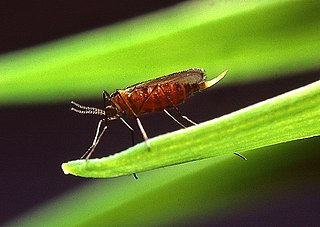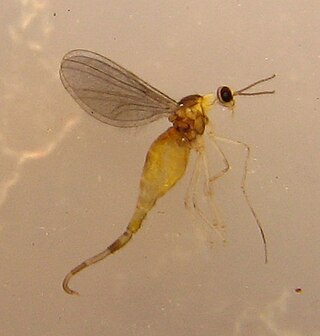
The Cecidomyiinae, commonly known as gall midges or gall gnats, is the largest subfamily in Cecidomyiidae with over 600 genera and more than 5000 described species. This subfamily is best known for its members that induce galls on plants, but there are also many species that are fungivores, parasitoids, or predators as maggots.

The Lasiopteridi is a supertribe of flies from the family Cecidomyiidae. They are often called gall midges or gall gnats.

Mayetiola are a genus of flies from the family Cecidomyiidae. Most species are pests of cereal crops.

Contarinia is a genus of midges, small flies in the family Cecidomyiidae. There are over 300 described species in the genus.

Rabdophaga is genus of flies in the family of gall midges Cecidomyiidae. There are 105 species distributed through Africa, Asia, Europe and North America. Most species of Rabdophaga gall willows ; one exception is R. giraudiana which galls the stems of poplars.

Schizomyia is a genus of gall midges. It has a cosmopolitan distribution.

Cecidomyiini is a tribe of gall midges in the family Cecidomyiidae. There are at least 220 described species in Cecidomyiini.

Asphondylia is a cosmopolitan genus of gall midges in the family Cecidomyiidae. All species in this genus induce galls on plants, especially on flowers and flower buds. There are over 300 described species in Asphondylia, with many more likely to be discovered and described, especially in the southern hemisphere.

Rhopalomyia is a genus of gall midges, insects in the family Cecidomyiidae. There are at least 267 described species in Rhopalomyia. Most species in this genus induce galls on plants in the Asteraceae. This genus has a cosmopolitan distribution. Rhopalomyia was first established by Ewald Heinrich Rübsaamen in 1892.
Alycaulini is a tribe of gall midges, insects in the family Cecidomyiidae. There are about 20 genera and at least 200 described species in Alycaulini.
Harmandiola castaneae is a species of gall midge, insects in the family Cecidomyiidae. This species induces leaf galls on Castanea dentata. It was first described by Fannie Adelle Stebbins in 1910.
Parallelodiplosis is a genus of gall midges, insects in the family Cecidomyiidae. There are at least 20 described species in Parallelodiplosis.

Asteromyia is a genus of gall midges in the family Cecidomyiidae. There are about nine described species in Asteromyia.
Cystiphora is a genus of gall midges in the family Cecidomyiidae. There are about seven described species in Cystiphora.

Resseliella is a genus of gall midges in the family Cecidomyiidae. There are at least 50 described species in the genus Resseliella.

Winnertziinae is a subfamily of gall midges and wood midges in the family Cecidomyiidae.

Janetiella is a genus of gall midges in the family Cecidomyiidae. There are at least thirty described species.
Prodiplosis is a genus of gall midges, insects in the family Cecidomyiidae. There are about 11 described species in Prodiplosis.

Ewald Heinrich Rübsaamen was a German teacher, artist, and amateur entomologist who studied gall forming insects, especially the gall midges (Cecidomyiidae), and worked on pest control in grapes, most importantly on Phylloxera.













